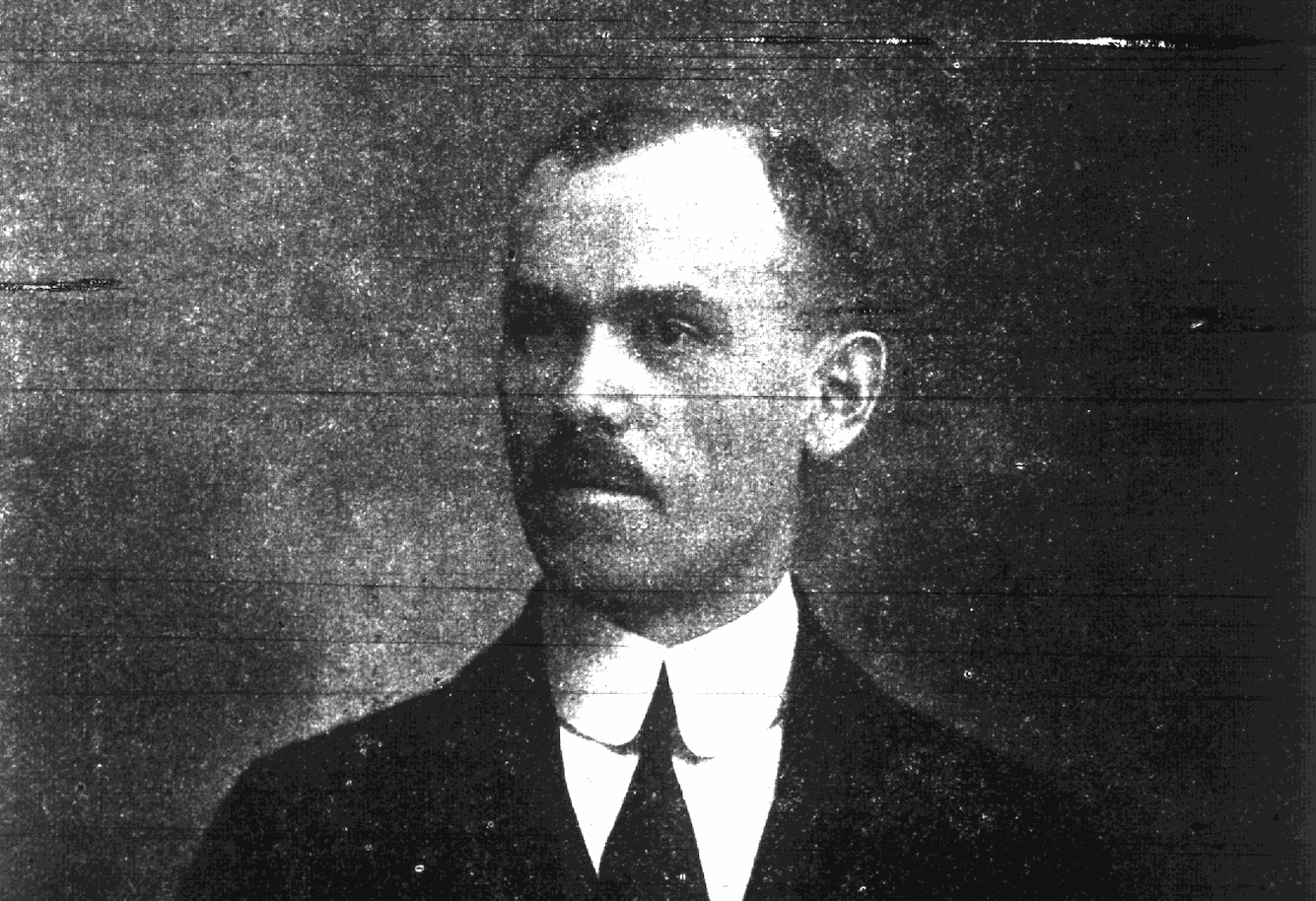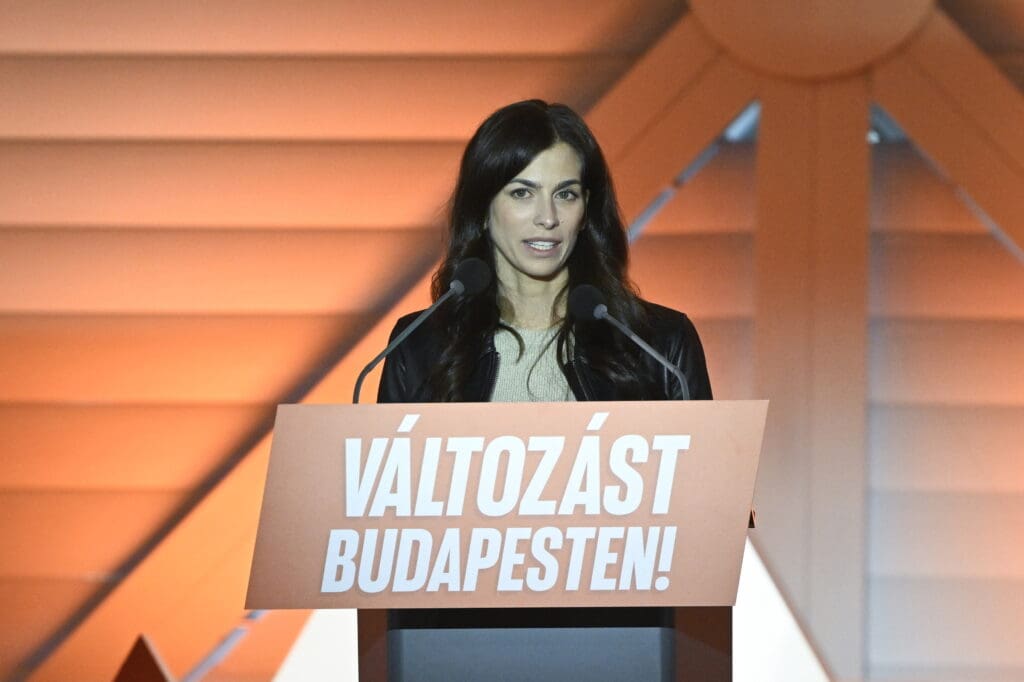In 1941, a pamphlet appeared with a front page that was attention-grabbing and to the point: on the cover of the booklet, which sought to expose the Arrow Cross pro-Nazi movement, a red snake wearing the green cross of the Arrow Cross Party coiled around the Hungarian national flag, its pole piercing the reptile like the spear of St George. The work was entitled Green Bolshevism and was written by László Budaváry, a Christian Socialist writer and politician who was previously known for his vehement anti-Jewish and far-right views. Budaváry, as I will explain below, did not deviate much from the Arrow Cross in terms of ideological history, and the motives of his attacks on the Arrow Cross were mixed at best. Yet his anti-Nazi writing deserves scholarly interest.[i]
Budaváry began his career as a Greek Catholic teacher, then served on the frontline during the First World War. According to a Jewish press report, his first public stunt took place in the city of Pápa after the war. He threatened to jump from the church tower if all Jews did not leave the city. The article that reported on the incident also claimed that Budaváry’s real name was Buturescu (a Romanian surname), but that claim was not picked up by any other outlet. The newspaper was mistaken in thinking that this was the first time Budaváry made it into the news. Ironically, he had written a revolutionary poem in October 1918, welcoming the Republic.[ii]
Budaváry later became a Christian Socialist member of parliament, but in the early years of the Horthy era, the only thing that made him stand out among his peers was his vehement anti-Semitism. Lajos Szabolcsi, editor of the paper Equality (Egyenlőség), recorded that Budaváry made more than 157 anti-Jewish speeches between 1919–1921. In August 1920, in a grandiose speech, he spoke up for the complete dispossession and disenfranchisement of the ‘bloodthirsty Jewish vermin’, demanding the confiscation of Jewish movable and immovable property, houses, land, theatres, licences, shops, etc., and their redistribution to poor Christians. His remarks give away the inherent contradiction in Budaváry’s selective social sensitivity: he could only conceive state intervention to alleviate poverty at the expense of the Jews. He made no secret of the fact that, in the field of education, for example, he wanted to have all his former Jewish colleagues dismissed, ‘so that the Jewish teachers could see the misery of life.’[iii] He cynically even called his proposals ‘philosemitic’, suggesting that his scourges were in fact meant to educate the Jews. His anti-Semitism, which was considered extreme even at the time, earned him the condemnation of many Christian writers.
Budaváry did turn against the Arrow Cross movement—but it would be difficult to say exactly when
László Budaváry’s views are also worth considering because—as I will show later—he did not actually give up many of them during his anti-Arrow Cross period. Nevertheless, Budaváry did turn against the Arrow Cross movement—but it would be more difficult to say exactly when. He certainly left the far-right Awakening Hungarian movement in 1927, but in 1934 the press still referred to him as far-right. He himself claimed to have been sympathetic to the National Socialist tendencies until 1935, but their corruption and conspiracies against the Hungarian state convinced him that the Arrow Cross movement was not a Hungarian movement. In 1938, he claims, the Arrow Cross threatened his life, ‘saying that I would be the first to be killed’. This is contradicted by the fact that Budaváry’s newspaper, Nemzeti Élet, was leased to the Arrow Cross between 1935–39—he claimed that he only gave them space in his newspaper because of financial difficulties. If he had any confrontations with the National Socialists before 1939, it may have been over personal matters: in 1934, for example, there was a press battle in which he called the National Socialist Zoltan Böszörmény a ‘mentally ill intellectual pigswill’. Some have speculated that Budaváry was bribed by the government to turn against the Arrow Cross, but it is more likely that there were unspoken personal vendettas behind the story.[iv]
Whatever his motives, it is undeniable that Budaváry was a fierce opponent of the Arrow Cross after 1939. Rezső Rupert, a smallholder politician and a well-known anti-Nazi, himself reported meeting Budaváry during his 1942 travels across the country: Budaváry described the Arrow Cross men as ‘bitter traitors’ who ‘promoted war’. ‘He also told me that he would do everything in his power against the Arrow Cross. He told me that he was travelling to rallies all over the country and crossing their paths wherever possible’. Rupert underlined his delight that a former racist politician had turned against the Arrow Cross. Budaváry also gave a copy of his book Green Bolshevism to his fellow politician. Interestingly, he also sent his book to public officials. In the archives of the town of Kaposvár, a letter has been preserved, addressed to a certain ‘notary’, in which he advertised his book as an exposé of the ‘Arrow Cross movement, fighting the class struggle’ using ‘the methods of Bucharin’.[v]
He did criticize the violent methods of the movement
Many of Budaváry’s arguments against the Arrow Cross were just as false and demagogic as those of the Arrow Cross itself. Claiming that the Arrow Cross was secretly financed by ‘Jewish capital’ or that they were controlled by freemasons behind the scenes can hardly be described as proper conservative criticism of the far-right. He did criticize the violent methods of the movement though, and Budaváry himself received several threats: an Arrow Cross newspaper published his obituary in advance, wishing that he may rest in peace (Budaváry’s only response was that the proverb says: ‘he whose death is rumoured will live long.’) Another Arrow Cross newspaper said that if they came to power they would ‘put Budaváry under the ground’. Of such newspapers, Budaváry wrote: ‘such a press should be clubbed to death like a rabid dog before it bites hundreds, thousands, tens of thousands to death.’ His last line seems to foreshadow what would later happen during the Nazi occupation and the Arrow Cross coup, and his next prediction, in which he philosophizes about what it would mean if Ferenc Szálasi [the leader of the Arrow Cross and dictator of Hungary between October 1944–April 1945] were to take power, proved to be equally correct: ‘What would happen if they were to take power? Terrible even to think about! The prisons and the dungeons would be filled not with criminals, but with the best patriots (…)’[vi]
Just as he did before the People’s Court, he repeatedly claimed throughout his career that he had long before given up anti-Semitism—and then somehow always found a way to start it again. He made such statements in 1940, but also in 1927 and 1931, when he said: ‘I confess frankly that I was in favour of a radical solution to the Jewish question at the time, but now I am ashamed and admit that I was wrong and I am therefore abandoning the antisemitism I preached before.’[vii] However, this was hardly true, since even in 1941 he was still attempting to conflate Jews and Arrow Cross activists in his articles. It is true, however, that after 1942 the question of antisemitism became less important in his work—and therefore he was no longer lying to Rezső Rupert when he spoke with him that year: ‘He also touched on the Jewish question, strongly blaming the treatment of the Jews and the taking away of their property. The defendant spoke of his own old role as a wrong road’. Indeed, this self-confession places him in a narrow, relatively clear-sighted radical right-wing group.[viii]
A number of Jews testified that Budaváry gave them shelter during the Holocaust
To prove this, he was able to produce several witnesses at the People’s Court who confirmed his humanitarian stance during the war and the Holocaust. András Garai testified that during the war he had helped several of his persecuted former army comrades and that his Jewish comrades were fond of him ‘because he behaved very well with them’. He added that ‘I also know that the defendant showed an understanding attitude towards the Jews during the war and even before the war.’ A number of other Jews testified that Budaváry gave them shelter during the Holocaust. He also helped his former regimental colleague Zoltán Bán between October and November 1944, and when Jewish officers were segregated at regimental meetings because of the Jewish laws, Budaváry made a comforting speech to his former comrades. ‘The accused was always on the best of terms with his Jewish comrades,’ one witness said. Similarly, István Kovarcz testified that Budaváry hid him and his Jewish wife until the Soviet army’s arrival, without taking any compensation.[ix]
The most extraordinary piece of his People’s Court material is undoubtedly his strange poem, written on 20 November 1944, which also demonstrates Budaváry’s stilted style as an author. The work is entitled On the Field of Death and was signed by ‘a bleeding Hungarian heart’; he originally intended to give it to the British radio, but in the end, he only distributed 500 illegal copies of it. In the poem, Budaváry described the situation of the country during the Arrow Cross terror as follows: ‘Death in front of us, the Germans behind us, / Bloodthirsty, wild Arrow Cross legions among us, / The treacherous bunch of the bastards, bearing the malformed cross, / Their leader a common criminal / They created bloody anarchy here, / Szálasi, may God strike you down!’ In his poem he also spoke about the Holocaust: ‘Hungary has never been so disgraced; / Bloody Jewish corpses on the road and in the street; / Those cannot walk anymore, / The Arrow Cross shoot like a rabid dog/Innocent children, women, girls, and old men / Are driven in endless rows by the bastards. / They throw her beauty to the German soldiers, / Her jewels and money to the Arrow Cross gang. / And then to the shame of Christianity and Hungarians / Like cattle to the slaughterhouse, / They take her to death. / A hundred in a wagon, well-locked, / Half of them will perish, and they will be kicked off, dead.’[x]
His poem ignores the actions of the Sztójay government and blames the deportations on the Arrow Cross, although it was undoubtedly brave of him to start distributing anti-Szálasi pamphlets in November 1944—and to have previously sheltered Jews. Nevertheless, he did not deny before the People’s Court that, if he was guilty of anything, it was ‘principled’ antisemitism: ‘If I must be punished for this, let me be condemned for it, but please take into account that I have seen the error of my ways and have tried to make amends for my mistakes.’[xi]
Budaváry’s work lacked the solid ideopolitical foundations that would have clearly separated his writings and speeches from the ideas of the Arrow Cross circles—all in all, Green Bolshevism is nothing more than a loud but misguided attack, some lines of which could have been included in the pro-Nazi journals as a programme point. However, his biography needs to be amended to also include his actions during the Holocaust, which distinguish him from other antisemitic politicians (see his part in rescuing people and his poems denouncing the deportations described above). Budaváry, who has so far been judged only on the basis of his early, extreme work, deserves—as all historical figures do—a nuanced and objective presentation, something this article seeks to contribute to.
[i] Budaváry László: Zöld bolsevizmus. A nemzetietlen nyilas-mozgalom hűséges és döbbenetes képe (Budapest: Nemzeti Élet, 19413). For his trial papers see: Budapest Főváros Levéltára, XXV.1.a.1945.778.
[ii] Egyenlőség, 1921. január 29., 1.
[iii] Komoróczy Géza (szerk.): Zsidók a magyar társadalomban. Írások az együttélésről, a feszültségekről és az értékekről, 1790-2012, I. köt. (Pozsony: Kalligram, 2015). I. köt., 791-793.
[iv] For the information in this paragraph, see the Budaváry trial papers, pages 33., 43., 147.
[v] Budaváry trial papers, 39-40. and Magyar Nemzeti Levéltár Somogy Megyei Levéltára, XXXII. 25. Andrássy Antal gyűjteménye. Box no. 31. No date.
[vi] On all this see: Nemzeti Élet, 1941. február 2., 3. and A Nép, 1942. december 3., 5 and Budaváry trial papers, 12., 14.
[vii] Egyenlőség, 1931. június 20., 15.
[viii] Budaváry trial papers, 39-40.
[ix] For these testimonies see the trial papers, 43-47.
[x] Budaváry trial papers, 164-165.
[xi] Budaváry trial papers, 148.








